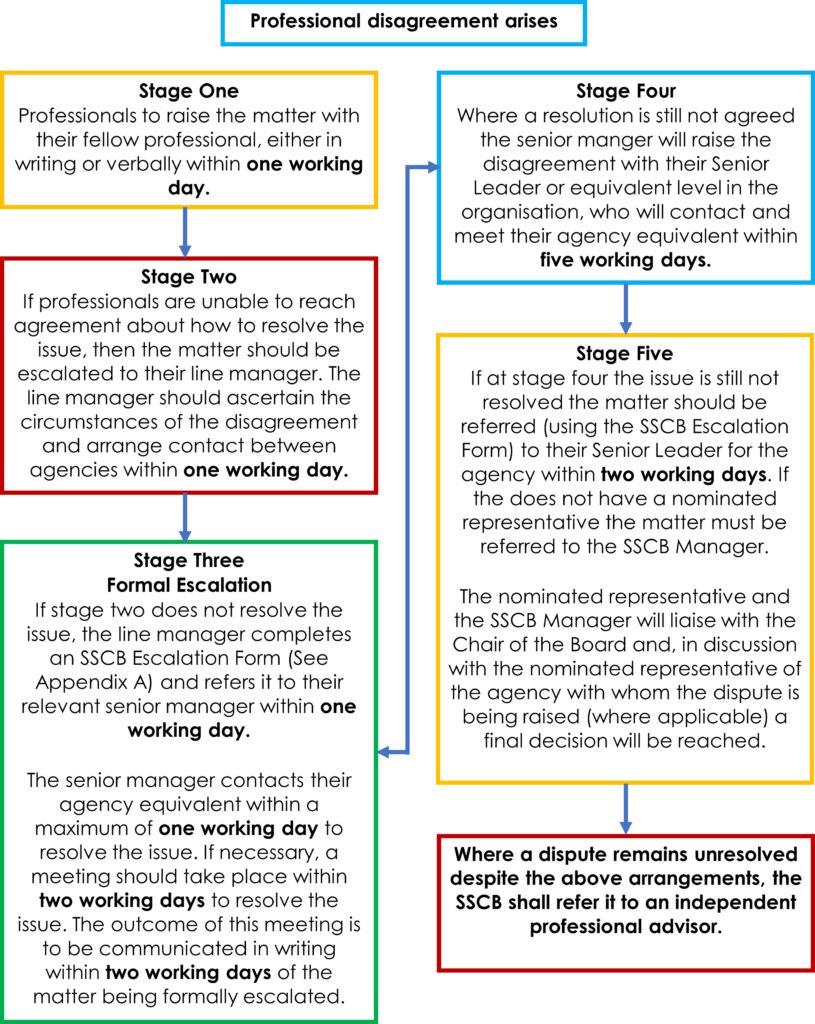SSCB Escalation Policy
At no time must professional disagreement detract from ensuring that the child is safeguarded. The child’s welfare and safety must remain paramount throughout. This policy identifies a non-exhaustive list of potential areas of disagreement, guidance on preventing disputes and procedures to be followed when disputes cannot be resolved through discussion and negotiation between professionals at front line level.
Introduction
Professionals providing services to children and their families should work co-operatively across all agencies, using their confidence, skills and experience to make a robust contribution to safeguarding children and promoting their welfare within the framework of discussions, meetings, conferences, and case management.
On occasions situations may arise where there is professional disagreement in relation to safeguarding a child. Resolution is an integral part of professional joint working to safeguard children and this policy seeks to identify how such resolution can be achieved where there are professional differences of opinion. All professionals have a responsibility to work together and to help to prevent disagreements from escalating where possible.
This policy identifies a non-exhaustive list of potential areas of disagreement, guidance on resolving disputes and procedures to be followed when disputes cannot be resolved through discussion and negotiation between professionals at front line level.
This is not an exhaustive list and other scenarios may warrant escalation
- Differing views about referrals meeting thresholds for assessment by Children’s Services
- A lack of understanding about respective roles and the need for communication and action
- A possible failure to adhere to mutually agreed plans. In such cases, this must be addressed by all agencies involved with the child and their family
- Disagreement may arise over another professional’s decisions, actions, or lack of actions in relation to a referral, an assessment, or an enquiry
- Children’s social care conclude that further information should be sought by the referrer before a referral is progressed.
- There is disagreement as to whether the child protection procedures should be invoked.
- Different agencies place different interpretations on the need for significant
agency response in relation to a child protection enquiry - There is a disagreement over the sharing of information and/or provision or services
- There is disagreement over the outcome of any assessment and whether the
appropriate action plan is in place to safeguard and promote the welfare of the child
Most disagreements can be resolved through restorative discussion and negotiation and professionals involved should raise the matter with their fellow professional, either verbally or in writing, within a maximum of one working day of the disagreement or on receipt of the disputed decision and they should provide clear evidence-based reasons for their disagreement. The professional should make it clear that this is in accordance with the agreed Local Safeguarding Children Board escalation procedure.
The receiving professional must read and review the case file, speak to the professional who has raised the disagreement as soon as possible and attempt to find a mutually agreeable way forward via a meeting or discussion. They may need to seek their own management advice if needed. If agreement is reached, the receiving professional will advise the agency of the outcome within a maximum of 1 working day* and confirm by in writing.
The professionals involved in this resolution process must record each intra-agency and multi-agency discussion they have, approve, and date the record and place a copy on the child’s file together with any other written communications and information.
If professionals are unable to reach agreement about how to resolve the issue, then the matter should be escalated to their line managers. The line manager should ascertain the specific circumstances of the disagreement and contact should occur between agencies within one working day. The purpose of this contact is to review the available information and to resolve the concern. Where necessary, this may involve a meeting between managers.
NB: It is worth noting that this process may vary depending on the management structure within an organisation. It is likely therefore that some stages may not be relevant. On this basis it is expected that professionals, as a minimum would have followed stage 1 and 2 before escalating to their senor leader within their organisation. Any agreed plan arising from this contact should be fed back immediately to the operational staff involved, confirmed in writing between agencies and include a date for review if required.
Each agency will need to define, through their respective scheme of delegation, who
their appropriate line management equivalents are e.g.:
- A police detective seargant
- A named or designated health professional
- A social work team manager/practice/principal manager/line manager
- A designated teacher
- A designated lead within Early Years
- A designated lead within the voluntary sector
It is acknowledged that some organisations, particularly in the third sector, may not have extended schemes of delegation. An appropriate person within this organisation must be identified to discuss and address the area of disagreement. In cases where there is confusion about thresholds and roles and responsibilities, peer support should be considered as a means of additional advice and support to the agency.
If agreement can be reached the responsible line manager will advise the agency of the outcome within a maximum of one working day and confirm by letter.
The professionals involved in this resolution process must record each intra-agency and multi-agency discussion they have, approve, and date the record and place a copy on the child’s file together with any other written communications and information.
Stage Three
If stage two does not achieve consensus between agencies, the line managers should refer the matter to their relevant senior managers, equivalent to service manager by completing an escalation form outlining the area of disagreement and what efforts
have been made to resolve the issue. This notification should be made within one working day. This will result in a review of the case, including the circumstances leading to the disagreement, with a view to resolving the issue.
The senior manager will contact their agency equivalent within a maximum of one working day and attempt to resolve the issue. If necessary, a meeting should take place within two working days to resolve the issue.
Any decision making arising from this process should be communicated to relevant
personnel in each agency without delay and in writing within two working days of the matter being formally escalated and be subject to monitoring and reviewing processes as appropriate.
Stage Four
Where a resolution is still not agreed the senior manager will raise the disagreement with their Senior Leader, or equivalent level in the organisation, who will contact and meet their agency equivalent within five working days.
Where concerns arise particularly in the management of a case, for example where an agency has failed to meet the specific requirements of the inter-agency plan to safeguard a child, a senior manager can request that an agency’s case record on the
child is reviewed. The respective agency representatives on the relevant Local Safeguarding Children Board Manager should be alerted that a disagreement has
reached this stage.
It will be unusual for many situations to reach this stage and for this reason there should be some consideration from the relevant Local Safeguarding Children Board as to whether there are wider lessons to be learned including any procedural or policy matters.
Any issues which have been resolved through use of the escalation procedure must be documented on all relevant case files for the purpose of audit trail.
Appendix 1 Formal Escalation Form
If it has not been possible to resolve the professional differences at stage three and four the matter should be referred to the nominated SSCB representative for the agency (see respective SSCB website https://staffsscb.org.uk/ for details of the agency representative). If the agency does not have a nominated representative the matter must be referred to the SSCB Board manager.
In all cases the SSCB ‘Formal Escalation’ form must be completed which should then be forwarded to the SSCB Board Manager. The escalation form will enable SSCB to collate evidence of escalations and to offer assurances that they are being resolved at the right level and to gather information about the issues that need to be resolved.
At all stages of the process, actions and decisions must be recorded in writing and shared with relevant personnel and include the professional who raised the initial
concern. This must include written confirmation between the parties about an agreed outcome of the disagreement and how any outstanding issues will be pursued.
In each case the nominated representative and SSCB Board Manager will liaise with the Chair of the Board as a matter of urgency and, in discussion with the nominated representative of the agency with whom the dispute is being raised (where applicable) a final decision will be reached.
Where a dispute remains unresolved despite the above arrangements, it shall be referred to an independent professional adviser.

